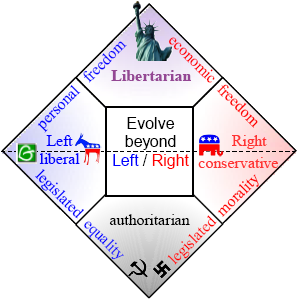(In Response to Question 3)
I am someone who was raised in a liberal household. My mother, brother, and sister all have strong liberal point of views. Growing up, I was always on the side of the liberals merely because I was following what my family supported. At some point, though, I started to view issues in my own mind- without paying any attention to the influence of my family. I started to view problems for what they were and figured out their roots and potential solutions. As I grew up, I became more and more conservative. Now, to clear up any confusion, I am not a full-fledged conservative. No, I would rather define myself as a libertarian. As a libertarian, I am more socially liberal than Democrats and more economically conservative than the Republicans. Obviously, I view this as the best way to stand.

In my senior year of high school, I was in a politics class. Our final project was to do extensive research on an issue and to present it to the class in a 40 minute long presentation. My topics were Obamacare and welfare programs– two things that I have a large problem with. My problem with neither program has to do with its goals, but rather has to do with its methods. I made sure that in my presentation I used as many facts and as much logic as possible, as these programs gain all of the strength in their standing strictly through an appeal to pathos, while ignoring most sense of logic. My goal was to derail their credibility through undermining their logic.

Spock from Star Trek- known for his great sense of logic
After my presentation was finished, I had many people approach me and commend me on my work and inform me that it opened their eyes in regard to all of these issues. My strong sense of logic and coherent presentation clearly communicated the issues to my audience, while I also utilized a sense of satire to mock the problems of the issues in order to retain the attention of my audience.

Jon Stewart, a great face of political satire
Many times, people have tried to convince me that both Obamacare and welfare programs are functioning effectively and efficiently, yet those same people have not been able to communicate to me a clear reason why the programs are successful other than just by proposing an emotional argument. A successful argument needs a sufficient balance of logos and pathos with just enough of a sense of ethos.


